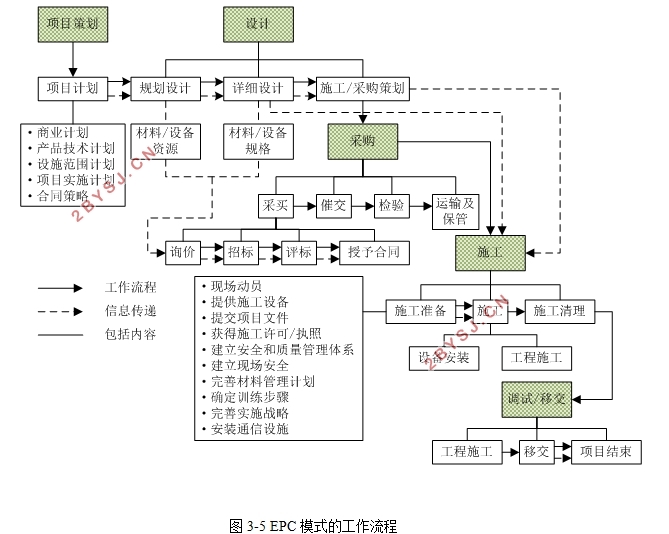工程总承包模式EPC与DB的比较研究
无需注册登录,支付后按照提示操作即可获取该资料.
工程总承包模式EPC与DB的比较研究(开题报告,论文22000字)
摘 要
尽管DB 与EPC两种模式同样均为工程总承包形式的建设模式,却在一些方面存在着差异。本文在分析DB与EPC两种模式内涵、组织框架、工作流程与内容及合同条件的基础上,系统地研究了两种模式下参与方的责任与风险分担、合同条件的特点,进一步从承包范围、承包商与业主责任与风险分担、承包商索赔范围、参与主体能力要求和适用性特点等方面进行了对比。经过研究得到,二者在设计和施工一体化及并行开展方面存在共同点。在EPC模式下,合同范围向前延伸至项目初期决策阶段,向后进一步到试运行阶段;项目交易成本进一步缩减,但业主对项目需求的定义更加困难;总承包商承担了更多的风险,索赔空间变小,合同的工期和价格相对更加固定。在对两种交易模式的比较基础之上,提出了影响模式决策的指标因素,运用层次分析法(AHP)构建了工程总承包决策模型。本文研究结果将有助于业主准确认识工程总承包模式在项目实施过程中的适用性,据此合理选择交易模式。
关键词:工程总承包;DB模式;EPC模式;比较;适用性;决策模型
A Comparative Study of EPC and DB in Engineering General Contract Model
Abstract
Both the DB and the EPC belong to the engineering general contracting mode, but the two differ in some respects. Based on the analysis of the connotation, organization framework, work flow and content and contract conditions of DB and EPC, this paper systematically studies the responsibilities and risk sharing of the participants and the characteristics of contract conditions under the two modes, and further the scope of contracting, contractor and the owner's responsibility and risk sharing, the scope of the contractor's claim, the ability of the participating entities, and the applicability characteristics were compared. After research, the two have commonalities in the integration of design and construction and parallel development. In the EPC mode, the project contracting scope is extended to the early stage of decision-making and the later stage of trial operation; the transaction cost of the project is reduced, but the owner's description of the project needs is more difficult; the general contractor bears more risks and the claim space changes. Small, the contract period and price are relatively more fixed. Based on the comparison of the two trading modes, the index factors affecting the mode decision are proposed, and the general contracting decision model is constructed by using the Analytic Hierarchy Process (AHP). The research results of this paper are beneficial to the owner to correctly understand the applicability of the general contracting project transaction mode in engineering practice, and choose the appropriate contracting mode in the project decision stage.
Key Words:general contracting; DB; EPC; comparison; applicability decision mode

目录
摘 要 I
Abstract II
第一章 绪论 4
1.1 研究背景和问题的提出 4
1.2 研究目的和意义 4
1.3 研究内容和方法 5
1.3.1 研究内容 5
1.3.2 研究方法 5
第二章 文献综述与理论基础 6
2.1 工程总承包基本理论 6
2.1.1 工程总承包模式的发展 6
2.1.2 工程总承包模式的价值与优势 7
2.2 EPC与DB总承包模式研究综述 8
2.2.1 工程总承包模式研究综述 8
2.2.2 EPC和DB模式比较研究综述 9
第三章 EPC与DB模式下的工作内容和合同条件 11
3.1 DB模式下的工作内容 11
3.1.1 DB模式的类型 11
3.1.2 DB模式的工作流程与工作内容 12
3.2 DB模式的合同条件分析 13
3.2.1 DB模式的标准合同条件概述 13
3.2.2 参与方的责任与风险分担 14
3.2.3 DB模式合同条件特点 15
3.3 EPC模式下的工作内容 16
3.3.1 EPC模式的分类 16
3.3.2 EPC模式的工作流程与工作内容 17
3.4 EPC模式的合同条件分析 18
3.4.1 EPC模式的标准合同条件概述 18
3.4.3 EPC模式合同条件特点 18
第四章 EPC与DB模式的比较分析 20
4.1 承包范围比较 20
4.1.1 设计工作 20
4.1.2 采购工作 20
4.1.3 设备安装与试运行 20
4.2 承包商与业主的责任与风险分担比较 21
4.2.1 关于业主文件的准确性 21
4.2.2 关于不利的现场条件 21
4.2.3 关于性能保证责任 23
4.3 承包商索赔范围对比 23
4.4 对承包商与业主能力要求比较 25
4.5 交易成本与合同价格类型的差异 26
4.6 适用性的差异比较 26
第五章 工程总承包模式决策模型 28
5.1 影响工程总承包模式选取的因素 28
5.1.1 工程性质 28
5.1.2 业主偏好 28
5.1.3 市场条件 29
5.2 基于层次分析法(AHP)的指标体系 30
5.2.1 选择AHP建立决策模型的依据 30
5.2.2 基于AHP的选择模型结构 30
5.3 工程总承包模式选择模型实施步骤 31
5.3.1 建立递阶层次结构模型 31
5.3.2 构造判断矩阵并赋值 32
5.3.3 层次单排序(计算特征向量)与一致性检验 32
5.3.4 层次总排序与一致性检验 34
5.3.5 结果分析 34
第六章 结论与展望 35
参考文献 36
致谢 39
